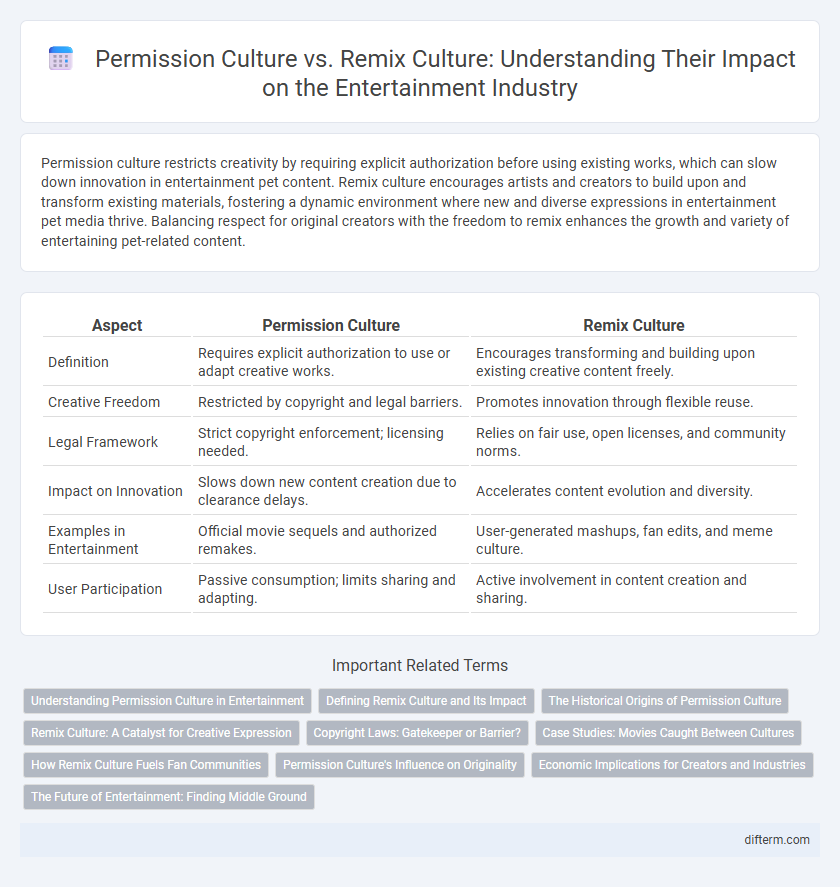Permission culture restricts creativity by requiring explicit authorization before using existing works, which can slow down innovation in entertainment pet content. Remix culture encourages artists and creators to build upon and transform existing materials, fostering a dynamic environment where new and diverse expressions in entertainment pet media thrive. Balancing respect for original creators with the freedom to remix enhances the growth and variety of entertaining pet-related content.
Table of Comparison
| Aspect | Permission Culture | Remix Culture |
|---|---|---|
| Definition | Requires explicit authorization to use or adapt creative works. | Encourages transforming and building upon existing creative content freely. |
| Creative Freedom | Restricted by copyright and legal barriers. | Promotes innovation through flexible reuse. |
| Legal Framework | Strict copyright enforcement; licensing needed. | Relies on fair use, open licenses, and community norms. |
| Impact on Innovation | Slows down new content creation due to clearance delays. | Accelerates content evolution and diversity. |
| Examples in Entertainment | Official movie sequels and authorized remakes. | User-generated mashups, fan edits, and meme culture. |
| User Participation | Passive consumption; limits sharing and adapting. | Active involvement in content creation and sharing. |
Understanding Permission Culture in Entertainment
Permission culture in entertainment emphasizes obtaining explicit authorization from original creators before using or altering their work, often leading to legal complexities and limited creative freedom. This framework prioritizes intellectual property rights, ensuring that original artists maintain control and receive compensation for derivative works. While protecting creators' interests, permission culture can restrict innovation and slow the collaborative evolution of cultural content.
Defining Remix Culture and Its Impact
Remix culture emphasizes the creative reworking and transformation of existing media, allowing artists and audiences to build upon prior works without strict reliance on permission. This approach fosters innovation by encouraging collaboration, reinterpretation, and the blending of diverse influences, significantly shaping the entertainment landscape through user-generated content and participatory media. Its impact challenges traditional intellectual property norms, promoting a more dynamic and accessible cultural economy.
The Historical Origins of Permission Culture
Permission culture traces its origins to early copyright laws established in the 18th century, designed to protect creators' rights and control the distribution of their work. This system requires individuals to seek explicit authorization before using copyrighted material, emphasizing ownership and legal compliance. The rise of mass media and digital technology later intensified enforcement, solidifying permission culture as a dominant framework in entertainment industries.
Remix Culture: A Catalyst for Creative Expression
Remix culture fuels innovation by allowing creators to reinterpret and build upon existing works, fostering a dynamic environment for artistic expression. This cultural paradigm encourages collaboration, diversity, and the evolution of ideas, driving the entertainment industry to new heights. Platforms like YouTube, TikTok, and SoundCloud exemplify remix culture's impact by providing accessible spaces for users to share transformative content globally.
Copyright Laws: Gatekeeper or Barrier?
Copyright laws act as gatekeepers that regulate creative content, often requiring permissions that can limit the freedom to remix or reuse existing works. Permission culture enforces strict control, potentially stifling innovation and cultural exchange by prioritizing original rights holders' authority. Remix culture, by contrast, challenges these barriers by promoting transformative works and collaborative creativity, advocating for a more flexible interpretation of copyright that balances protection with artistic freedom.
Case Studies: Movies Caught Between Cultures
Permission culture in entertainment often restricts creativity by requiring explicit authorization for using existing works, as seen in cases like the lawsuit over "The Lion King," which faced claims of copying "Kimba the White Lion." Remix culture thrives on transformative works that blend or alter content, exemplified by "Deadpool," which reimagined superhero tropes, challenging traditional intellectual property norms. These case studies highlight the tension between protecting original creators' rights and fostering innovative reinterpretations within the movie industry.
How Remix Culture Fuels Fan Communities
Remix culture fuels fan communities by enabling fans to creatively reinterpret and share their favorite media, fostering collaboration and deeper engagement. Platforms like YouTube and TikTok provide accessible spaces for fans to produce derivative works such as fan art, videos, and music mashups without seeking formal permission. This open creative exchange strengthens social bonds within fan communities and amplifies diverse expressions of fandom.
Permission Culture's Influence on Originality
Permission culture significantly restricts creative expression by requiring artists to obtain authorization before using existing works, often stifling innovation and limiting the evolution of new original content. This controlled approach prioritizes copyright holders' rights, which can hinder transformative creativity and discourage risk-taking in artistic endeavors. As a result, permission culture often curtails the dynamic exchange of ideas crucial for fostering originality within the entertainment industry.
Economic Implications for Creators and Industries
Permission culture often restricts creators through costly licensing and legal barriers, limiting economic opportunities and innovation. Remix culture encourages transformative works and mashups, fostering new revenue streams and broader market engagement by allowing creators to build upon existing content. Industries embracing remix culture can benefit from increased consumption, diversified income sources, and enhanced collaborative creativity within the digital economy.
The Future of Entertainment: Finding Middle Ground
Permission culture restricts creative expression by requiring explicit authorization for using existing works, limiting innovation and diversity in entertainment. Remix culture encourages reinterpretation and transformation of content, fostering collaboration and new forms of media that resonate with diverse audiences. The future of entertainment lies in balancing copyright protection with flexible fair use policies to enable creativity while respecting original creators' rights.
Permission culture vs Remix culture Infographic

 difterm.com
difterm.com